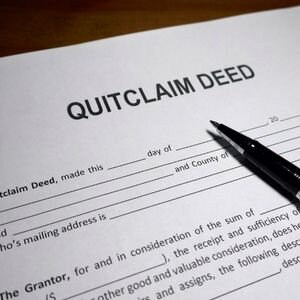
How to Do a Quitclaim Deed on a House in Boston, MA
If you need to move property around and everybody keeps throwing around this “quitclaim deed” thing, you came to the right spot. Whatever’s going on (maybe your ex finally agreed to sign the house over, or mom wanted to add you to the family place), quitclaim deeds are very useful!
We’re going to show you exactly how this works in Massachusetts because we do things totally different here, and that’s actually advantageous for you!
What Makes Massachusetts Quitclaim Deeds Unique?
While every other state says, “here’s your property, good luck, hope it doesn’t suck,” Massachusetts actually gives you some backup.
When someone signs a quitclaim deed here, they’re promising they didn’t screw anything up while they owned the place. Did they forget to pay property taxes? That’s their problem to fix. Did they let their contractor put a lien on the house? They have to deal with that before giving it to you.
You’re still stuck with whatever disasters happened before they bought it, but at least you know they didn’t make new ones. Wondering more about seller obligations at the closing table? Check out our guide on Does a Seller Pay Closing Costs in Boston MA to understand exactly what’s required.
When to Use a Quitclaim Deed in Boston
This is your best option when you’re dealing with people who aren’t going to screw you over. Family, spouses, that ex who actually turned out to be decent.
Divorce situations love quitclaim deeds because they reduce the headaches significantly. One person will sign over their share of the house and you get a clean break, no lingering ownership mess. Parents handing down the family property also works great since everyone trusts each other and nobody’s trying to hide problems.
Estate planning gets way easier, too, when you need to move property into a trust. Your financial planner will probably suggest this exact move. Sometimes, title companies find ancient claims from random people who owned the property decades ago and a quitclaim deed from those people makes those old ghosts vanish completely.
Quitclaim Deed Process for a House in Boston, MA

Let’s get you through this thing without any issues and rejected paperwork.
Step 1: Gather Required Documents and Legal Description
Look for your current deed right now. Seriously, stop reading and go find it. You need that legal description, which is a really boring paragraph that tells the world exactly where your property sits. Go on and check your closing paperwork, your mortgage docs, or that random folder of house stuff you’ve been ignoring.
Still can’t find it? Fine, drive down to 50 State Street and buy a certified copy from Suffolk County Registry. It’ll cost you a dollar per page but beats guessing and getting it wrong.
Step 2: Complete the Quitclaim Deed Form
Now you deal with the actual paperwork. Grab a form from the county website, buy one online, or get your lawyer to hand you one. Then, fill in the grantor: that’s whoever owns the place now and wants to give it away. Add the grantee: whoever’s about to become the new owner.
Write down how much money changed hands, even if it’s just a buck for a family gift. Now copy that legal description EXACTLY from your original deed. One wrong letter and you’re starting over.
Step 3: Understanding Massachusetts Covenant Requirements
Pay attention here because Massachusetts is super picky about words. Your deed must say “quitclaim covenants” or “limited covenants” somewhere in there. If you miss this, you’ve just filed the wrong type of deed entirely.
Most printed forms already have this language baked in, but check anyway because the Registry will reject your filing if you mess this up.
Step 4: Determine How the Grantee Takes Title
This part stumps everyone, but it’s actually simple once you know what you’re doing. If one person is getting the property, just write their name. For multiple people, you need to pick how they’ll own it together.
Married couples usually go with “tenants by the entirety” so when one dies, the other gets everything automatically. Siblings or business partners often choose “tenants in common” so everyone can leave their chunk to whoever they want.
Joint tenancy works, too. Survivors usually split up the dead person’s share.
Step 5: Sign and Notarize the Document
Do NOT sign this until you’re sitting across from a notary! Bring your license or some other government ID. The notary watches you sign, checks your ID, and stamps it official.
Only the person giving away the property has to sign. The person getting it can just watch. Most notaries charge ten to twenty bucks, so call around if you want to save a few dollars.
Step 6: File with Suffolk County Registry of Deeds
Final step and you’re done! Take your signed, notarized deed to 50 State Street in Boston, that’s the Suffolk County Registry office. Bring $155 cash or a check for the filing fee.
They’ll look over your paperwork, stamp it with official recording info, and hand you back a copy. Your property transfer is now carved in stone and searchable by anyone who cares to look. It takes about fifteen minutes if you do everything right.
What Are the Legal Requirements and Costs of a Quitclaim Deed?
Here are some fees and paperwork that Massachusetts demands for a quitclaim deed filing:
Massachusetts General Laws Chapter 183 Requirements
Chapter 183 is super demanding. Your deed has to be written down (obviously) but it also has to be on white paper that weighs at least 20 pounds.
Yeah, they actually care about paper weight! Keep it under 8.5 by 14 inches or they’ll toss it back at you. Leave a three-inch margin at the top of the first page because apparently the state needs room for their stamps.
Oh, and that notarization we talked about? Totally mandatory. Skip it and your deed becomes expensive scrap paper.
Filing Fees and Transfer Taxes
Suffolk County wants $155 just to look at your deed and file it. Bring cash or a check because they’re not running a charity here. But wait, there’s more! Massachusetts also slaps you with a transfer tax of $2.28 for every $500 of property value. Got a $400,000 house? Then you just earned a $1,824 tax bill on top of that filing fee.
Do the math before you show up so you don’t get sticker shock at the counter.
Tax Implications and Exemptions
Uncle Sam and Massachusetts will also start fighting over your money. If you gift property to a family with zero cash changing hands, you might dodge the transfer tax completely. Massachusetts gives you a break if less than $100 actually gets paid.
However, the IRS is watching and they hate big gifts. Real estate definitely gets their attention. Plus, you’ve got capital gains taxes lurking if you’re selling for more than you paid.
Massachusetts grabs 5% for long-term gains, 8.5% for short-term, and the feds want their cut, too. Plan accordingly or get ready for some painful tax surprises next April.
Common Mistakes to Avoid When Filing a Quitclaim Deed

People screw this up constantly and then wonder why their paperwork got rejected. Learn from their pain and save yourself the headache of doing this twice.
Incorrect or Incomplete Legal Property Description
If you copy the legal description wrong, leave out a word, or decide to paraphrase it because it sounds stupid, your deed is worthless. The Registry doesn’t care if you think “Lot 5 Block 3” sounds better than the official gibberish that takes up half a page.
Copy it exactly, word for word, comma for comma. One tiny difference and you’ve just wasted your filing fee and have to start over. So get the original deed, put it right next to your form, and copy like your life depends on it. Also, making sure your home is well-prepared can help you sell your Boston house faster if you decide to go that route instead of transferring ownership.
Missing Required Covenant Language
Massachusetts demands the words “quitclaim covenants” or “limited covenants” appear somewhere in your deed. If you forget them, you’ve accidentally filed a release deed instead, which gives you way less protection.
Most people assume the form they downloaded has everything they need, but some cheap online forms don’t mention the crucial language. Read your form carefully before you sign it. See those covenant words? Great. Don’t see them? Get a different form or you’ll regret it later.
Improper Notarization or Signature Issues
Signing before you get to the notary is amateur hour and will kill your filing instantly. The notary has to watch you sign, that’s literally their job.
Bring proper ID or they won’t notarize anything. Some people bring expired licenses or random cards that aren’t government-issued and then act shocked when the notary refuses to help them.
Also, make sure the person whose name is on the deed is the same person showing up to sign. Sounds obvious but happens more than you’d think.
Filing with Wrong Registry Office or Incomplete Documentation
Boston property goes to Suffolk County Registry at 50 State Street. Period. People somehow end up at other county offices and waste entire days trying to file in the wrong place.
Also, showing up without your filing fee or with incomplete paperwork means you’re making another trip. Bring everything you need the first time: signed and notarized deed, filing fee, and any additional forms Suffolk County requires.
You may also want to check their website before you go, so you don’t become another person standing there looking confused.
Should You Hire an Attorney for Your Quitclaim Deed?
You’re probably wondering whether getting an attorney is worth it. You’re not alone. People get really torn here because lawyers cost money, but mistakes cost more money. Here’s the honest breakdown of when professional help makes sense.
Pros of Hiring an Attorney:
- They know exactly what language to use and which forms actually work in Massachusetts.
- They’ve done hundreds of these and won’t accidentally file the wrong type of deed.
- They’ll spot potential problems you’d never think of, like weird restrictions, other people who might have claims.
- You’ve got someone to blame if something goes wrong later.
- Most charge around $200 to $300, which is cheaper than fixing expensive mistakes.
- They can handle complex situations involving multiple owners or complicated family dynamics.
Cons of Hiring an Attorney:
- This costs $200 to $300 when you might be able to do it yourself for just filing fees.
- It takes longer to schedule appointments and get paperwork done.
- It might be overkill for simple family transfers where everyone agrees.
- You still need to gather all the documents and information anyway.
- Some lawyers will overcomplicate simple situations.
Want to skip the legal hassle altogether? Learn more about how our process works to get a quick cash offer instead.
Important Note: You can probably handle a quitclaim deed yourself if you’re dealing with simple family transfers and everyone’s being cooperative. This is also safe for simple divorce situations where both people agree, adding your spouse to a deed after marriage, or basic estate planning moves.
Just make sure you’re comfortable reading legal documents and following detailed instructions exactly. If you start feeling confused or overwhelmed, stop and call a lawyer before you mess something up permanently.
Alternative Property Transfer Methods in Massachusetts
In Massachusetts, you have several ways to move property around and quitclaim deeds aren’t always your best option. Here’s what else you can use depending on your situation.
Warranty Deeds
Warranty deeds is the gold standard of protection because the seller promises the title is completely clean and will defend against any claims from the beginning of time. These cost more and take longer to prepare, but buyers love them because they get maximum protection.
You can use these for most regular real estate sales where strangers are buying and selling property.
Release Deeds
Release deeds go the opposite direction. They transfer property with zero promises or protection. The person getting the property takes whatever they get, problems and all.
These work when someone just wants to give up any potential claim they might have without making any guarantees.
Life Estate Deeds
Life estate deeds let you give property to someone while keeping the right to live there until you die. Your kids get the property eventually but you get to stay put and keep control during your lifetime.
Enhanced Life Estate Deeds (Lady Bird Deeds)
Enhanced life estate deeds work similarly to regular life estate deeds. However, they give you more flexibility to change your mind or sell the property later without asking permission from the future owners.
What Happens After Filing Your Quitclaim Deed
You walked out of the Registry office with your stamped copy… now what? There are a few important steps to make sure everything works correctly and to protect yourself.
Recording Timeline and Confirmation
Suffolk County typically processes your deed the same day you file it, assuming your paperwork is correct. They’ll stamp it with the official book and page numbers where it’s recorded, plus the date and time.
Keep that stamped copy in a safe place because it’s your proof the transfer actually happened. The deed will become part of the public record immediately, which means anyone can look it up online and see the ownership change.
Most people can find their recorded deed on the Suffolk County Registry website within 24 to 48 hours of filing. But if you’re feeling overwhelmed by the paperwork and timelines, you can always sell your Massachusetts house fast for cash instead of managing a complicated deed transfer.
Title Search Verification
Many order a title search about two months after filing to make sure the deed actually removed the right person from the title. This costs around $150 but will give you peace of mind that the transfer worked correctly.
Sometimes deeds get recorded but don’t properly clear up ownership issues due to legal description problems or missing information. A title search will catch these problems early when they’re easier to fix.
Title companies can run this search for you and will tell you exactly who owns the property according to their records.
Future Property Sale Considerations
That quitclaim deed you just filed will show up forever in the property’s chain of title. Future buyers and their attorneys will see it and ask questions about why it was used instead of a warranty deed. This usually isn’t a big deal for family transfers or divorce situations, but it might slow down a sale slightly while everyone explains what happened.
Keep good records of why you used a quitclaim deed and what the circumstances were. Future title companies might want documentation showing the transfer was legitimate and not some attempt to hide problems or avoid creditors.
Frequently Asked Questions About Boston Quitclaim Deeds

Can a Quitclaim Deed Be Reversed or Challenged?
Yeah, quitclaim deeds can get challenged in court, but it’s pretty hard to do successfully. Someone would need to prove fraud, forgery, or that the person signing wasn’t mentally capable of making the decision.
Elder abuse cases sometimes involve challenging quitclaim deeds when someone tricked a confused elderly person into signing over their property. Courts will also reverse deeds if someone forged signatures or lied about what the document actually was.
But if everyone was honest and competent when they signed, your deed is probably bulletproof. Keep good records showing the person understood what they were signing and wasn’t under pressure or being deceived.
Does a Quitclaim Deed Affect Mortgage Obligations?
Nope! The deed changes who owns the property but doesn’t touch who owes the mortgage. Your name comes off the deed but stays on the loan unless you refinance or get the lender to agree to remove you. This creates a risky situation where you’re still responsible for payments on a house you don’t own anymore.
Most people need to refinance the mortgage into the new owner’s name or get a loan assumption approved by the lender. Don’t assume the mortgage automatically transfers with the property because it definitely doesn’t.
How to file a quit claim deed in Massachusetts?
We just covered this whole process above, but here’s the super quick version: get your documents together, fill out the form with exact legal descriptions, sign it in front of a notary, and file it at the Suffolk County Registry of Deeds with your $155 fee.
The entire process takes about a week if you’ve got all your paperwork ready. Don’t skip any steps or try to take shortcuts because you’ll just end up doing it twice.
Why does Massachusetts use quitclaim deed?
Massachusetts uses quitclaim deeds because they’re fast, cheap, and work great for family transfers and other situations where people trust each other. The state made them better than most places by adding those limited covenants, so you get some protection without the full cost and complexity of warranty deeds.
They’re perfect for divorce cleanups, adding spouses to deeds, estate planning moves, and fixing title problems. Massachusetts real estate lawyers love them because they’re simple to prepare and rarely cause problems later.
What is the best way to get a quit claim deed?
Download the form from Suffolk County’s website if you’re doing it yourself, or hire a real estate attorney if you want professional help. Most people can handle simple family transfers on their own using the official forms.
However, if you’re dealing with complicated ownership situations, lots of money, or people who don’t trust each other, spend the $200 to $300 to get a lawyer involved. They’ll make sure the language is correct and the deed actually accomplishes what you want.
Who benefits the most from a quitclaim deed
Divorced couples benefit huge because quitclaim deeds let them split property fast without expensive legal battles. Families transferring property between generations also win big since the process is simple and cheap. People doing estate planning love them for moving property into trusts.
Meanwhile, property investors use them constantly to clean up title issues and speed up transactions. Anyone who needs to fix old paperwork problems or add someone to a deed gets major benefits from the simplicity and speed of quitclaim deeds.
Key Takeaways
Quitclaim deeds in Massachusetts work differently than everywhere else because they actually give you some protection through those limited covenants. The process is simple: gather your documents, fill out the form exactly right, get it notarized, and file it at Suffolk County Registry with your $155 fee. Watch out for common mistakes like copying the legal description wrong or forgetting the required covenant language. You can probably handle simple family transfers yourself, but hire a lawyer for complicated situations or when lots of money is involved.
If you’re dealing with a property situation that’s gotten too messy or stressful to handle, sometimes selling for cash is the smartest move. The CNC Offers team can help with quick, stress-free home purchases. Skip all the deed paperwork headaches by getting a fair cash offer instead. Call us at (781) 205-9928 to see if selling makes more sense than transferring ownership.
Helpful Boston Blog Articles
- Guide To Selling Your Boston, MA, Home With Mold
- Selling A House With A Mortgage In Boston, MA
- Selling a Probate House in Boston, MA
- Fixing Up a House to Sell in Boston, MA
- How to Do a Quitclaim Deed on a House in Boston, MA
- Does a Seller Pay Closing Costs in Boston MA
- Selling House by Owner Paperwork in Boston MA
- Selling a House with Foundation Problems in Boston, MA
- Can You Put a Lien on a House in Boston, MA

